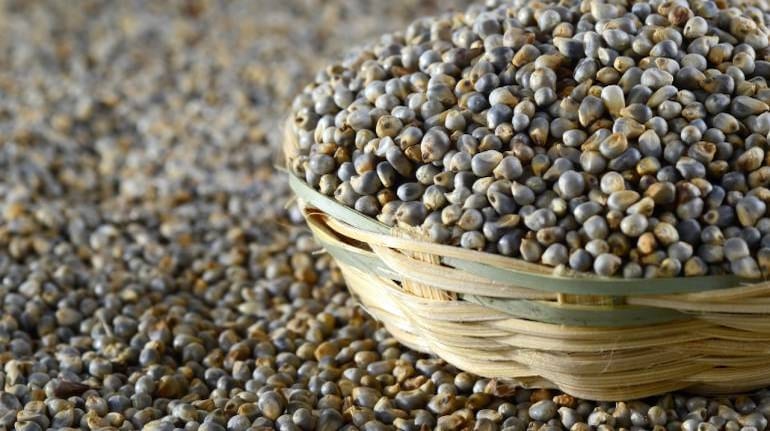Blood
Health benefits of bajra in winter: Keeps blood sugar low, boosts immunity, helps you lose weight
Health benefits of bajra: “It is rich in essential nutrients like iron, magnesium, phosphorus, and fibre. It is low in glycemic index, making it an ideal choice for maintaining stable blood sugar levels—a crucial factor in managing winter health,” says Chandni Haldurai, Head of Nutrition at Cure.Fit (Image: Canva)
It’s that time of the year again when the change in season compels you to change your diet chart. If Punjab’s flavour lies in makke ki roti and sarson ka saag, then Rajasthan’s defining taste is found in bajre ki roti paired with jaggery and white butter. Both these meals are a winter delight, and there are compelling reasons to incorporate bajra into your diet during winter, regardless of where you stay.
With the onset of winter, our dietary preferences lean towards foods that offer warmth and nourishment. Bajra, also known as pearl millet, is a humble yet powerful grain that has served as a winter staple across various cultures for centuries. Its long list of health benefits and adaptability makes it an indispensable dietary inclusion during the colder months. Says Chandni Haldurai, Head of Nutrition at Cure.Fit, “Bajra, one of the oldest cultivated grains, offers many health benefits. It is rich in essential nutrients like iron, magnesium, phosphorus, and fibre. It is low in glycemic index, making it an ideal choice for maintaining stable blood sugar levels—a crucial factor in managing winter health.”
Haldurai adds that bajra’s abundance of phytochemicals and antioxidants shields against oxidative stress, promoting overall well-being. Its gluten-free nature not only caters to those with dietary restrictions but also offers a versatile option for various culinary needs.
Whether in the form of rotis, porridge, pancakes, or as an addition to soups, its versatility makes it an excellent choice for all. Bajra’s nutritional prowess and array of health advantages make it a winter essential.
7 compelling health benefits of consuming bajra:
Strengthens immunity: Bajra, with its high content of zinc and iron, actively supports the immune system by aiding immune cell function. These minerals play an important role in boosting the body’s defense mechanism, ensuring better protection against common seasonal illnesses.
Regulates blood sugar: Its low glycemic index assists in stabilising blood sugar levels, which is vital in managing diabetes during winter. Multiple studies reveal that those consuming higher quantities of whole grains like bajra experience a reduced risk of type 2 diabetes. The fibre in this grain, being harder to digest, prevents the blood sugar spikes associated with refined grains, consequently promoting better insulin utilisation and maintaining blood sugar stability.
Supports digestive health: Bajra, with its abundance of dietary fibre, is great for your gut health. The high fibre content in bajra aids digestion, prevents constipation, and maintains digestion. This grain serves as nourishment to good gut bacteria, contributing to a healthy and balanced gut environment.
Enhances heart health: Pearl millet is rich in magnesium and potassium. These help in regulating blood pressure and reduce the risk of cardiovascular issues. Including a diet rich in bajra can effectively lower total cholesterol, LDL (bad cholesterol), triglycerides, and blood sugar levels. According to a study in Harvard, women who consume two to three servings of whole grains daily are less likely to experience a heart attack or succumb to heart disease compared to those consuming less than one serving of whole grains weekly.
Manages weight: Bajra’s fibre content contributes significantly to your weight management goals. It ensures a feeling of fullness, which means you curb overeating tendencies, and the low glycemic index stabilises blood sugar levels. Furthermore, its nutrient profile includes essential vitamins and minerals that contribute to your well-being during weight loss journey.
Supplies energy: Bajra’s complex carbohydrates ensure a steady energy release, combating the common winter lethargy. Magnesium in bajra supports food conversion into energy, regulates the nervous system, and facilitates protein synthesis. Fatigue, an initial symptom of magnesium deficiency, is mitigated by adequate bajra intake, promoting elevated energy levels.
Aids bone health: Loaded with phosphorus, bajra helps make our bones strong and teeth strong. It keeps you away from seasonal illnesses like joint pains. Moreover, women who consume two or more servings of whole grains daily experience a lower risk of mortality from inflammation-related conditions. These conditions, such as rheumatoid arthritis, gout, asthma, ulcerative colitis, Crohn’s disease, Alzheimer’s disease, and Parkinson’s disease, can severely impact one’s health.

